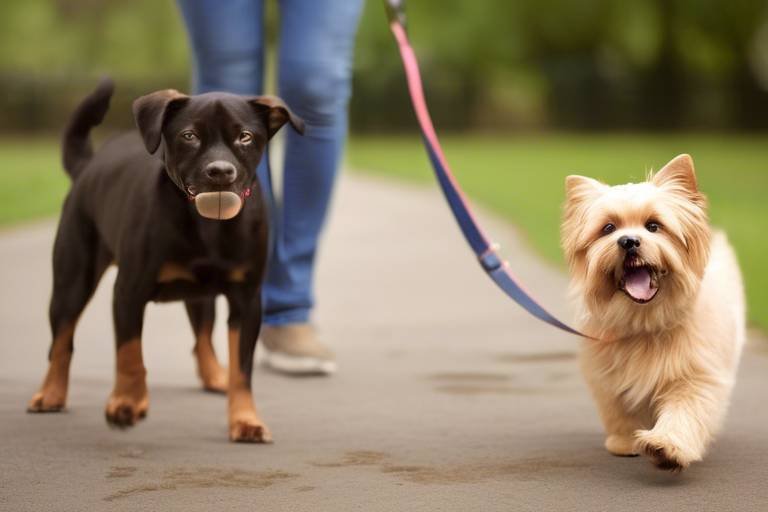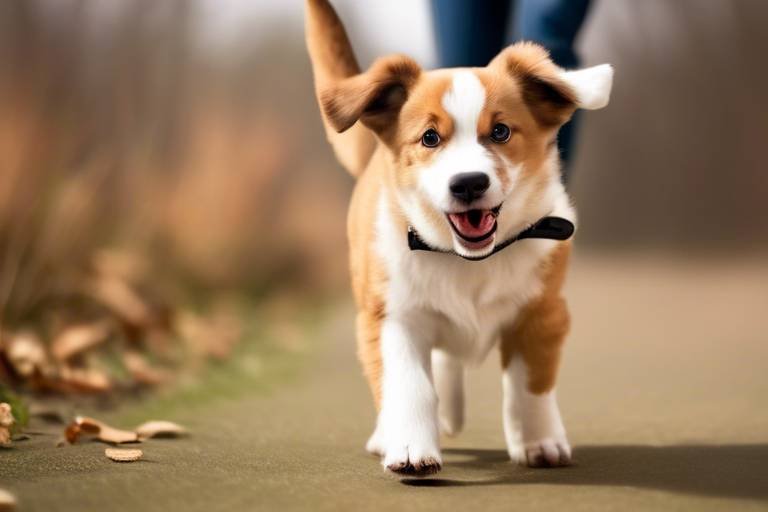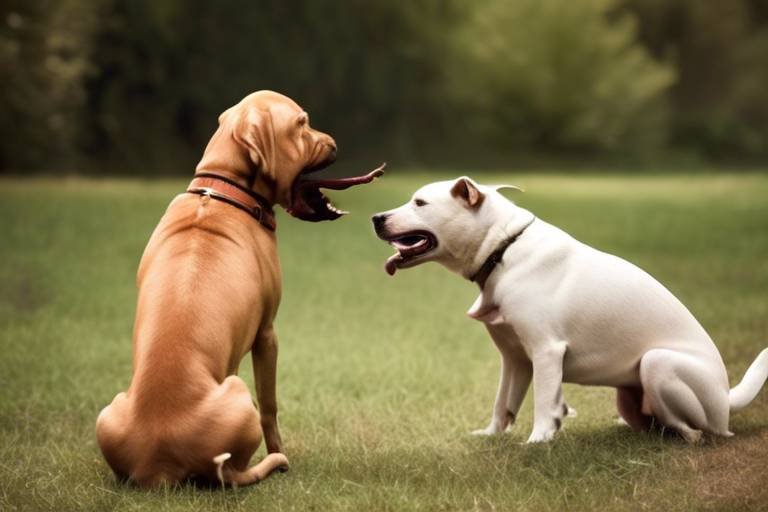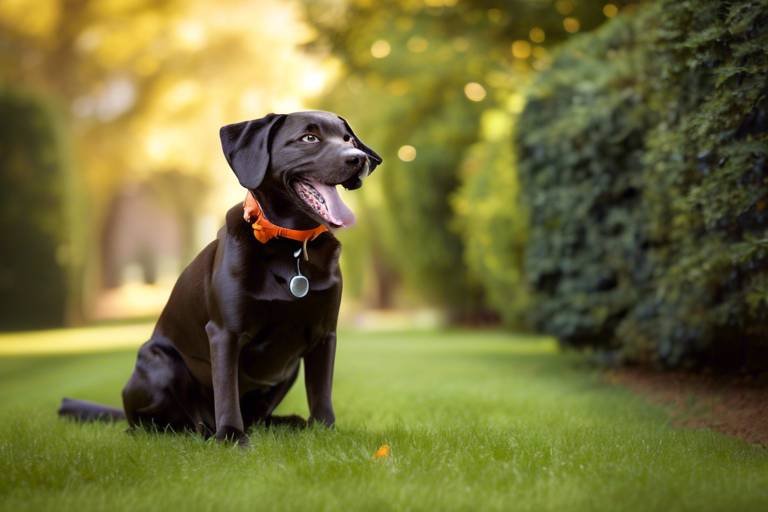The Importance of Social Play for Dogs
Social play is not just a fun pastime for our furry friends; it is a critical component of their overall well-being. Just like humans, dogs thrive on interaction, and social play provides them with the opportunity to engage with their peers and their human companions. Imagine a world where dogs can express themselves freely, build friendships, and release pent-up energy—all while having a blast! This article dives deep into the significance of social play in dogs, exploring its myriad benefits for their physical and mental health, as well as its vital role in developing social skills and strengthening bonds with both humans and other dogs.
So, what exactly is social play? At its core, social play involves interactive behaviors between dogs, characterized by playful movements, vocalizations, and body language. It’s that joyous moment when two dogs chase each other around the park, or when your pup engages in a playful tug-of-war with you. This type of play is essential for a dog's happiness and health. It not only allows them to express their natural instincts but also helps them learn how to communicate effectively with others. Just like children learn social norms through play, dogs also pick up on cues that are crucial for their development. Without social play, a dog may miss out on important lessons in communication and social behavior, leading to potential issues down the line.
Engaging in social play offers numerous advantages for dogs, enriching their lives in ways that go beyond mere enjoyment. From boosting physical fitness to enhancing social skills, the benefits are far-reaching. Let's take a closer look at how social play positively impacts a dog's life.
Regular social play is a fantastic way to keep your dog physically fit. Just like a good workout session for humans, active play helps dogs maintain a healthy weight and improves their cardiovascular health. When dogs engage in play, they are not just having fun; they are also burning calories, strengthening their hearts, and improving their overall vitality. Think of it as a two-for-one deal—exercise and enjoyment all rolled into one!
One of the most significant advantages of social play is its role in preventing obesity. Dogs that engage in regular play with other dogs are more likely to stay active and maintain a healthy weight. A dog that is constantly on the move is less likely to become overweight. Regular play sessions can include various activities such as running, fetching, or even playing hide-and-seek, all of which contribute to calorie burning. Keeping your dog fit not only helps them live longer but also enhances their quality of life.
Social play is also crucial for muscle development. When dogs engage in different types of play, they strengthen their muscles and improve their coordination. For instance, a game of tug-of-war can enhance a dog's grip strength, while chasing after a ball can improve their agility and endurance. Just like humans build muscle through exercise, dogs benefit similarly from active play. The result? A more toned, agile, and healthy dog ready to take on any adventure!
It's not just their bodies that benefit from social play; their minds do too! Social interactions during playtime stimulate a dog's mind, reducing boredom and anxiety. Think of play as a mental workout that keeps their brains sharp and engaged. When dogs are mentally stimulated, they are less likely to engage in destructive behaviors out of boredom. This mental engagement through play fosters emotional stability and resilience, making for a happier and more balanced canine companion.
Through social play, dogs learn vital communication cues and social norms. Just as children learn how to navigate social situations through play, dogs also develop important skills that help them interact with others. Playtime interactions shape a dog's behavior, enhancing their ability to connect with both humans and other dogs.
During play, dogs learn to interpret body language and vocalizations. These skills are essential for preventing conflicts and fostering harmonious relationships among dogs. For instance, a dog that understands when another dog is feeling overwhelmed can back off and avoid a potential confrontation. This understanding comes from numerous play interactions, highlighting the importance of social play in a dog's life.
Social play also serves as a training ground for conflict resolution skills in dogs. Through play, dogs learn how to navigate disagreements with their peers. They practice skills like taking turns, sharing resources, and recognizing when to back off. These experiences are invaluable, as they equip dogs with the tools they need to handle real-life social situations more effectively.
- What age should my dog start social play? Puppies can start social play as early as 8 weeks old, but it's essential to ensure they are vaccinated first.
- How often should my dog engage in social play? Aim for at least 30 minutes of social play every day to keep your dog healthy and happy.
- Can social play help with my dog's anxiety? Yes! Regular social play can significantly reduce anxiety and improve your dog's overall mental health.

Understanding Social Play
Social play is a fundamental behavior in dogs that fosters interaction with their peers, and it's a delightful spectacle to witness. Imagine watching a group of dogs bounding around in the park, tails wagging, and playful barks filling the air. This vibrant scene is not just a display of joy; it's a crucial aspect of a dog's development and well-being. Social play encompasses various activities, from chasing and wrestling to tugging and romping. These interactions are essential for dogs, as they allow them to express their natural instincts while also learning important life skills.
But why is social play so essential for a dog's overall well-being? Well, think of it as a doggy version of school. Just like children learn social skills through play, dogs do the same through their interactions. Social play helps dogs develop their physical, emotional, and cognitive abilities, ensuring they grow into well-adjusted adults. It is during these playful moments that dogs learn to communicate effectively with each other, understand boundaries, and establish social hierarchies. Without adequate social play, dogs may struggle with anxiety, aggression, or other behavioral issues.
Moreover, social play is not just beneficial for dogs interacting with their fellow canines; it also plays a significant role in their relationship with humans. Dogs that engage in regular social play are often more confident and comfortable around people. They learn to read human cues and respond appropriately, which can lead to stronger bonds between dogs and their human companions. In essence, social play acts as a bridge, connecting dogs to their peers and their human families, fostering a sense of community and belonging.
In conclusion, understanding social play is vital for any dog owner. It’s not merely a form of entertainment; it’s a critical component of a dog's health and happiness. By recognizing the significance of these playful interactions, you can ensure your furry friend leads a fulfilling and enriched life. So, the next time you see your dog playing with others, remember that they are not just having fun; they are learning, growing, and thriving.
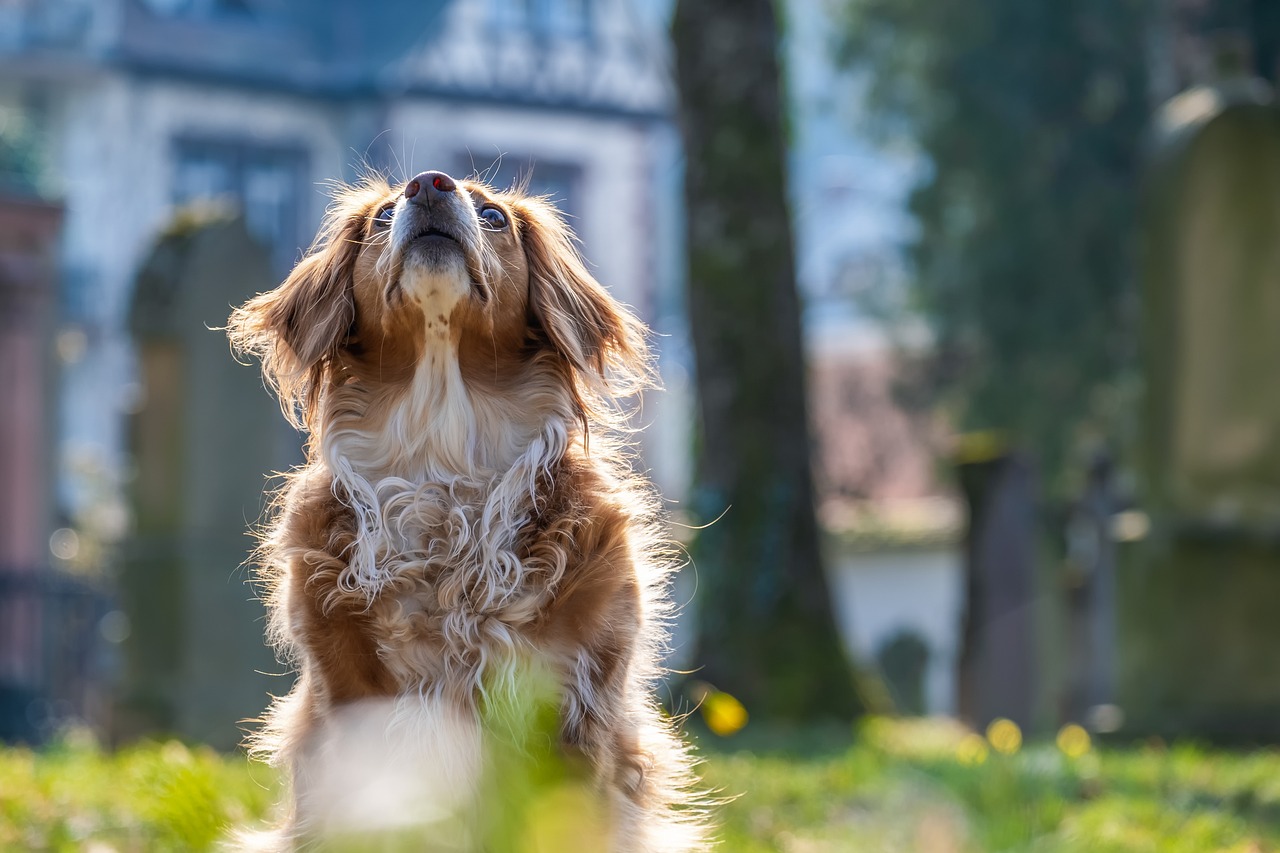
Benefits of Social Play
Engaging in social play is not just a fun pastime for dogs; it’s a vital component of their overall health and well-being. Think of social play as a multi-faceted gem that sparkles with various benefits, each facet contributing to a dog's happiness and health. Through play, dogs not only burn off excess energy, but they also enjoy a plethora of advantages that enrich their lives. One of the most significant benefits is the improvement in physical health, which we will dive into shortly.
But wait, there's more! Social play is also a fantastic way to enhance a dog’s social skills. Just like humans, dogs thrive on social interactions, and playtime offers them the perfect opportunity to learn how to communicate with their peers. This can include everything from understanding body language to learning when to back off. Imagine a puppy learning to read the mood of another dog—this skill is honed during those playful interactions!
Moreover, social play acts as a natural stress reliever. Dogs that engage in regular play with other dogs tend to experience lower levels of anxiety and stress. The joy of running around, wagging tails, and playful barks creates a happy atmosphere that can help alleviate feelings of loneliness or fear. A playful dog is often a confident dog, and this confidence can translate into better behavior at home and in public spaces.
Here's a quick breakdown of the primary benefits of social play:
- Physical Health: Regular play helps maintain a healthy weight and promotes cardiovascular fitness.
- Mental Stimulation: Engaging with other dogs keeps their minds sharp and reduces boredom.
- Social Skills Development: Dogs learn essential communication cues and how to interact appropriately with others.
- Stress Reduction: Playtime can significantly lower anxiety and promote emotional well-being.
In essence, social play is like a workout session that also doubles as a therapy session for dogs. It’s a win-win situation! When dogs engage in play, they’re not just having fun; they’re also working on their physical fitness, sharpening their minds, and building essential social skills. So, the next time you see your furry friend frolicking with others, remember that they are doing more than just playing—they are investing in their health and happiness!
Physical Health Benefits
When it comes to our furry friends, ensuring their physical health is a top priority for any responsible pet owner. One of the most enjoyable and effective ways to keep dogs fit is through social play. Regular interactions with other dogs not only provide entertainment but also serve as a fantastic workout. Just like humans, dogs need to stay active to maintain their overall health and vitality. Imagine your dog as a little athlete, needing practice and training to stay in shape. Social play is that practice, and it comes with a host of benefits.
Engaging in play with their canine companions helps dogs burn off excess energy, which is crucial for preventing obesity. Obesity can lead to numerous health issues, including joint problems and heart disease. By participating in fun activities like chasing, wrestling, and fetching, dogs can keep their weight in check. In fact, studies have shown that dogs who regularly engage in social play are less likely to become overweight compared to those who spend most of their time alone or inactive.
Furthermore, social play significantly contributes to muscle development. Just like a good workout for humans, playing fetch or tug-of-war helps dogs build strength and improve their coordination. When dogs sprint, jump, and engage in playful wrestling, they're not just having fun; they're also toning their muscles and enhancing their agility. This is especially important for young dogs that are still growing, as it lays the foundation for a strong and healthy body.
To give you a clearer picture of how social play supports physical health, here's a quick summary:
| Benefit | Description |
|---|---|
| Weight Management | Regular play helps prevent obesity by encouraging movement. |
| Muscle Development | Engaging in various play activities strengthens muscles and improves coordination. |
| Cardiovascular Health | Active play promotes a healthy heart and circulatory system. |
In conclusion, the physical health benefits of social play are undeniable. By encouraging your dog to interact and play with other dogs, you're not just providing them with joy and entertainment; you're also contributing to their long-term health and happiness. Think of social play as a fun fitness regime that not only keeps your dog in shape but also enriches their life in countless ways. So, grab that ball, head to the dog park, and let the games begin!
- How often should my dog engage in social play? Ideally, dogs should have opportunities for social play several times a week to reap the full benefits.
- Can social play help with behavioral issues? Yes, social play can help reduce anxiety and improve social skills, which can lead to better behavior.
- What types of play are best for my dog? Activities like fetch, tug-of-war, and group play with other dogs are excellent choices.
Weight Management
When it comes to our furry friends, maintaining a healthy weight is crucial for their overall well-being. Engaging in social play is one of the most enjoyable and effective ways to help dogs manage their weight. Think of it as a fun workout session with friends! Just like humans benefit from group fitness classes, dogs thrive in social environments where they can run, jump, and play with their peers. This not only keeps them active but also makes exercise feel less like a chore and more like a party.
One of the primary reasons why social play is so effective for weight management is that it naturally encourages dogs to move around. When dogs engage in play, they often run around chasing each other, wrestling, or playing tug-of-war. These activities are not just fun; they are excellent forms of exercise that help burn calories and build muscle. In fact, studies have shown that dogs who regularly participate in social play tend to have better body conditions compared to those who are more sedentary.
Moreover, social play can help prevent obesity by creating a routine that incorporates physical activity into a dog's daily life. For instance, doggy playdates or trips to the dog park can become regular events that not only provide exercise but also enhance the dog’s social skills. When dogs play together, they instinctively engage in various movements that promote cardiovascular health and strengthen their muscles. This dynamic and interactive form of exercise is essential for maintaining a healthy weight and preventing the onset of obesity-related health issues.
To illustrate how social play contributes to weight management, consider the following table that outlines the various activities and their calorie-burning potential:
| Activity | Calories Burned (per 30 minutes) |
|---|---|
| Chasing a ball | 150 |
| Wrestling with other dogs | 200 |
| Tug-of-war | 175 |
| Running at the dog park | 250 |
As you can see, the numbers speak for themselves! Incorporating these playful activities into your dog's routine can significantly contribute to their weight management efforts. Additionally, it’s essential to pair social play with a balanced diet to maximize the benefits. Always consult with your veterinarian to tailor a plan that suits your dog’s specific needs.
In conclusion, social play is not just about having fun; it's a vital component of a dog's physical health and weight management strategy. By encouraging your dog to engage in regular play with other dogs, you are not only helping them stay fit but also enriching their lives with social interactions. So, grab that frisbee, head to the park, and let the games begin!
- How often should my dog engage in social play? - Ideally, dogs should have social play sessions several times a week to reap the full benefits.
- Can any dog participate in social play? - Most dogs can participate, but it's essential to consider their temperament and social skills.
- What if my dog is shy or aggressive? - Consult a professional trainer or behaviorist to help your dog learn appropriate social skills.
- Are there specific breeds that benefit more from social play? - While all dogs can benefit, breeds that are naturally more social, like Labradors and Golden Retrievers, may thrive in these environments.
Muscle Development
When it comes to our furry friends, is crucial for their overall health and agility. Engaging in social play is not just about having fun; it is also a fantastic way for dogs to build and maintain their muscle strength. Just like humans, dogs require regular exercise to keep their muscles toned and functional. Think of social play as a gym session for your dog, where they can run, jump, and wrestle with their companions. This kind of playful interaction not only helps in muscle development but also enhances their coordination and balance.
During playtime, dogs engage in various activities that involve different muscle groups. For instance, when a dog chases after a ball or another dog, they utilize their leg muscles, improving their speed and endurance. Similarly, when they engage in tug-of-war or wrestling, their upper body muscles get a workout. These activities can be likened to a full-body workout session, where every muscle group gets its share of action.
Moreover, social play encourages dogs to engage in movements that they might not typically do during solitary play. This variety in movement is essential for developing muscle memory and improving overall physical performance. For example, when dogs leap to catch a frisbee, they not only strengthen their legs but also enhance their core stability, which is vital for their agility. Thus, social play becomes a dynamic exercise routine, promoting a healthy lifestyle for our canine companions.
It's essential to remember that different breeds may have varying physical capabilities, and their play should be tailored accordingly. For instance, a high-energy breed like a Border Collie may thrive on more vigorous play, while a smaller breed like a French Bulldog might prefer gentler interactions. Regardless of the breed, the key is to ensure that playtime is both enjoyable and beneficial. Regular social play sessions can lead to a noticeable improvement in your dog's muscle tone and overall fitness.
In conclusion, muscle development through social play is not merely a bonus; it is a vital component of a dog's health regimen. By facilitating opportunities for your dog to engage with others, you are not only enhancing their physical fitness but also enriching their lives. Every wag of the tail and every joyful bark during playtime is a testament to the benefits of social interaction and muscle development.
- How often should my dog engage in social play? Ideally, dogs should have the opportunity to play with other dogs several times a week to maintain their physical and mental health.
- Can older dogs benefit from social play? Absolutely! Older dogs can also enjoy social play, which can help keep them active and engaged.
- What types of play are best for muscle development? Activities that involve running, jumping, and tugging are excellent for building muscle strength.
- Is it safe for my dog to play with larger dogs? Supervision is key. Ensure that the play is safe and that your dog is comfortable with the size difference.
Mental Health Benefits
Engaging in social play is not just about having fun; it plays a critical role in a dog's mental health. Just like humans, dogs experience a range of emotions, and playtime can be a fantastic outlet for their feelings. Regular interaction with other dogs and humans during play helps to stimulate a dog’s mind, reducing feelings of boredom and anxiety. Imagine a child playing on a playground; the laughter, the joy, and the interactions are not just entertaining, but they also contribute to the child's emotional growth. Similarly, when dogs romp around with their furry friends, they are not only exercising their bodies but also their minds.
One of the most significant benefits of social play is its ability to foster emotional stability. Dogs that engage in regular play are generally more resilient to stressors in their environment. They learn to cope with excitement, frustration, and even disappointment in a safe and controlled setting. For instance, when a dog plays tug-of-war with a buddy, they learn to manage their energy and emotions. If the game gets too intense, they can practice calming down and taking turns, which is a vital skill in maintaining healthy relationships.
Moreover, social play encourages the development of problem-solving skills. Dogs often encounter challenges during play, such as figuring out how to retrieve a toy from a tricky spot or navigating around other dogs. These experiences sharpen their cognitive abilities and enhance their adaptability. Just as a child learns to share toys and negotiate rules during playdates, dogs also learn to interact and communicate effectively with their peers. This not only enriches their playtime but also translates into better behavior in everyday situations.
In addition, social play can significantly reduce the risk of developing behavioral issues. Dogs that lack socialization opportunities may exhibit signs of aggression or fearfulness. Through regular play, they learn important social cues, such as when to back off and when to engage. This learning process is crucial for preventing conflicts and fostering harmonious relationships with both dogs and humans. Just like a well-adjusted person can navigate social situations with ease, a well-socialized dog can thrive in various environments.
To sum it up, the mental health benefits of social play for dogs are profound. It not only enhances their emotional well-being but also equips them with essential skills for life. So, if you want your furry friend to be happy and balanced, make sure to prioritize playtime with other dogs. Just remember, a happy dog is a healthy dog!
- How often should my dog play with other dogs?
It's ideal for dogs to engage in social play several times a week, depending on their energy levels and social needs. - Can social play help with my dog's anxiety?
Absolutely! Regular social interactions can significantly reduce anxiety and improve your dog's overall mood. - What types of play are best for my dog?
Interactive games like fetch, tug-of-war, and agility courses are great ways to encourage social play.
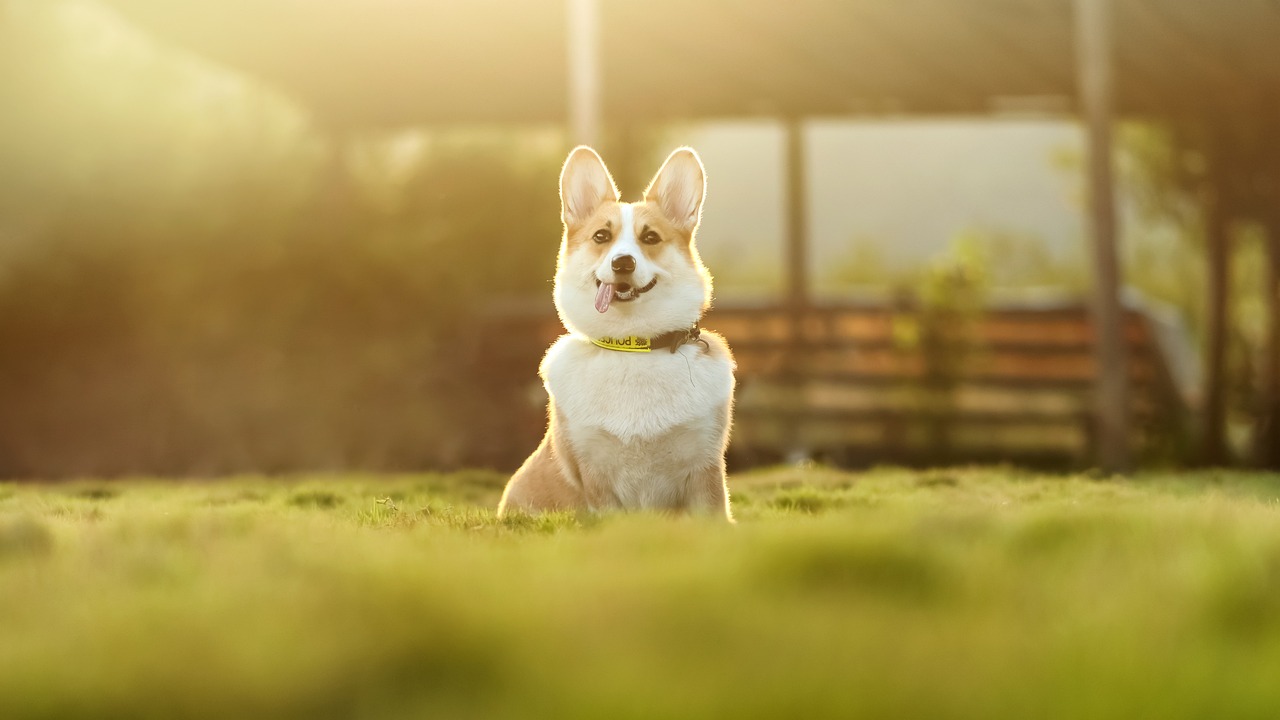
Building Social Skills
Social play is not just about having fun; it's a vital component in a dog's development that helps them build essential social skills. Just like humans learn to communicate and interact with others through play, dogs also pick up on important cues and behaviors during their playtime. When dogs engage in social play, they are essentially attending a classroom where the curriculum revolves around understanding body language, vocalizations, and social norms. This learning experience is crucial for their ability to connect with both humans and other dogs.
During these playful interactions, dogs learn to interpret various communication cues that are fundamental in their social interactions. For instance, a wagging tail might indicate excitement, while a low growl could signal discomfort. By observing and participating in play, dogs become adept at reading these signals, which helps them avoid potential conflicts. Imagine a dog at a park; they see another dog approach with a friendly demeanor, and they instinctively know how to greet them without causing any misunderstandings. This ability to interpret body language and vocalizations is a significant aspect of their social development.
Moreover, social play serves as an excellent platform for dogs to practice conflict resolution skills. In the wild, dogs often face challenges that require them to navigate disagreements with their peers. Playtime mimics these real-life scenarios, allowing dogs to learn how to handle disputes in a safe environment. For example, if one dog becomes too rough during play, the other dog might yelp or back off, teaching the first dog to adjust their behavior. This trial-and-error process is essential for developing emotional intelligence and understanding the boundaries of acceptable behavior.
Additionally, the interactions that occur during social play can foster a sense of community among dogs. When they engage in group play, they not only learn from their peers but also develop a network of social relationships. This network can lead to more stable and harmonious interactions, reducing the likelihood of aggressive behavior and anxiety. Just like humans thrive in social settings, dogs benefit immensely from having a circle of friends to play and interact with. The more they play, the more they grow, both socially and emotionally.
In summary, building social skills through play is an invaluable aspect of a dog's life. It helps them understand the world around them, enhances their communication abilities, and equips them with the tools necessary for conflict resolution. So, the next time you watch your dog frolicking with friends, remember that they are not just playing; they are learning and growing in ways that will benefit them throughout their lives.
- Why is social play important for dogs?
Social play is crucial for dogs as it helps them develop communication skills, learn social norms, and build relationships with other dogs and humans. - How can I encourage my dog to engage in social play?
Taking your dog to parks, arranging playdates with other dogs, and participating in doggy daycare can encourage social play. - What are the signs that my dog is enjoying playtime?
Signs include a wagging tail, playful barking, and a relaxed body posture. If your dog is engaging positively, they are likely enjoying themselves. - Can too much play be harmful?
While play is essential, excessive play can lead to exhaustion or injury. It's important to monitor your dog's energy levels and provide breaks as needed.
Communication Cues
When you watch dogs play, it’s like witnessing a beautiful dance of communication. Dogs are not just having fun; they are engaging in a complex language of body movements and sounds that convey their feelings and intentions. This is where come into play. Through social interactions, dogs learn to interpret various signals from their peers, which is essential for their social development. Think of it as a social school where every bark, wag, and posture teaches them something new about relating to others.
For instance, a dog that playfully bows with its front legs stretched out and its rear end raised is signaling that it’s ready to play. This posture is universally recognized among dogs as an invitation. On the other hand, if a dog approaches with a stiff body and a low tail, it may be feeling threatened or defensive. Understanding these cues can prevent potential conflicts and foster harmonious relationships among dogs.
Moreover, dogs also learn to recognize vocalizations that accompany these physical cues. A playful growl can mean excitement, while a high-pitched yelp might indicate that a dog is feeling overwhelmed. As dogs engage in social play, they refine their ability to read these signals, enhancing their communication skills significantly. This skill not only helps them interact better with other dogs but also aids in their relationships with humans. A well-socialized dog can express its needs and feelings more clearly, making it easier for owners to understand and respond appropriately.
To illustrate the importance of these communication cues, let’s look at a simple table that summarizes some common signals and their meanings:
| Signal | Meaning |
|---|---|
| Play Bow | Invitation to play |
| Tail Wagging | Excitement or happiness |
| Low Tail and Ears Back | Feeling scared or submissive |
| Barking | Varies; can indicate excitement, alertness, or a desire to play |
As you can see, these cues are not just random behaviors; they are essential for a dog's ability to navigate its social world. By engaging in social play, dogs not only enjoy themselves but also build a repertoire of communication skills that will serve them throughout their lives. This learning process is vital for their emotional and social well-being. So, the next time you see your dog playing with its friends, remember that they are not just having fun—they are also mastering the art of communication!
- What are communication cues in dogs?
Communication cues are signals that dogs use to convey their feelings and intentions to other dogs and humans, including body language and vocalizations. - How can I help my dog learn communication cues?
Engaging your dog in regular social play with other dogs can enhance their understanding of these cues, as they learn from observing and interacting with their peers. - Why are communication cues important for dogs?
Understanding communication cues helps dogs navigate social situations, reducing the risk of conflict and fostering better relationships with other dogs and humans.
Conflict Resolution
Conflict resolution is a crucial skill that dogs develop through social play, akin to how we learn to navigate tricky social situations with friends. When dogs engage in play, they often find themselves in scenarios where disagreements arise—whether it's over a favorite toy or simply who gets to chase the ball first. These moments of tension are not just random occurrences; they serve as vital learning experiences for our furry friends. Just like humans, dogs need to learn how to express their feelings, understand others’ emotions, and negotiate their way through conflicts.
During playtime, dogs communicate their intentions through a variety of body language cues, such as growling, barking, or even the way they position their bodies. For instance, when a dog playfully growls, it’s often a signal that they’re excited rather than aggressive. This type of communication is essential as it helps dogs establish boundaries and understand when their playmate is feeling overwhelmed or uncomfortable. By observing and responding to these cues, dogs learn to adjust their behavior accordingly, which is a fundamental aspect of conflict resolution.
Moreover, social play acts as a training ground for dogs to practice resolving disputes. When two dogs tug on the same toy, they might initially seem to be in a standoff. However, through playful interactions, they learn to take turns, share, or even engage in a friendly game of chase to diffuse the situation. This is where the magic happens: they discover that cooperation can be more rewarding than competition. Just like in human interactions, the ability to compromise and find common ground is key to maintaining friendships.
To illustrate this, consider the following table that outlines common conflict scenarios during dog play and the resolutions they often reach:
| Conflict Scenario | Typical Resolution |
|---|---|
| Two dogs want the same toy | One dog drops the toy and engages in a chase instead |
| One dog is too rough during play | The other dog signals discomfort and takes a break |
| Dogs are barking at each other | They switch to a game of tag to redirect their energy |
In essence, play is not just a way for dogs to burn off energy; it's a fundamental aspect of their social development. By engaging in play, dogs learn to navigate the complexities of social interactions, which includes understanding when to back off and when to engage. This ability to resolve conflicts not only strengthens their relationships with other dogs but also enhances their interactions with humans. As they learn to read the room (or the park), they become more adept at responding to social cues, making them well-rounded companions.
- How can I encourage my dog to play with others? - You can set up playdates with other dogs, visit dog parks, or enroll in dog training classes that include socialization.
- What should I do if my dog gets too aggressive during play? - It's important to intervene calmly and redirect their attention to a toy or a different activity. Consistent training can help manage aggressive tendencies.
- Can older dogs still learn conflict resolution skills? - Absolutely! Dogs of all ages can benefit from social play, as it's never too late to improve their social skills.
Frequently Asked Questions
- What is social play in dogs?
Social play is a fundamental behavior where dogs interact with each other in a playful manner. This can include chasing, wrestling, and other fun activities that allow them to express themselves and bond with their peers.
- Why is social play important for my dog?
Social play is crucial for a dog's overall well-being. It helps improve their physical health, enhances their social skills, reduces anxiety, and strengthens the bond between dogs and their humans.
- How does social play benefit my dog's physical health?
Engaging in social play helps maintain a healthy weight, promotes cardiovascular health, and strengthens muscles. Dogs that play regularly are more likely to stay fit and active, which is essential for their longevity.
- Can social play help with my dog's anxiety?
Absolutely! Social interactions during playtime stimulate a dog's mind, reducing boredom and anxiety. This mental engagement fosters emotional stability and resilience, making your dog happier and more content.
- How do dogs learn social skills through play?
Through social play, dogs learn important communication cues and social norms. They pick up on body language and vocalizations, which helps them navigate relationships with other dogs and humans more effectively.
- What are some signs that my dog is enjoying social play?
Look for signs like wagging tails, playful barks, and relaxed body language. If your dog is engaging in play bows or inviting other dogs to chase them, it’s a good indication they’re having a great time!
- How can I encourage my dog to play socially with others?
To encourage social play, you can arrange playdates with other friendly dogs, visit dog parks, or enroll in doggy daycare. Just make sure the environment is safe and that the dogs are well-matched in size and temperament.
- Is it normal for dogs to have disagreements during play?
Yes, it’s normal for dogs to have minor disagreements during play. However, it’s important to monitor their interactions and intervene if things get too rough. Teaching dogs conflict resolution skills through play can be beneficial.






